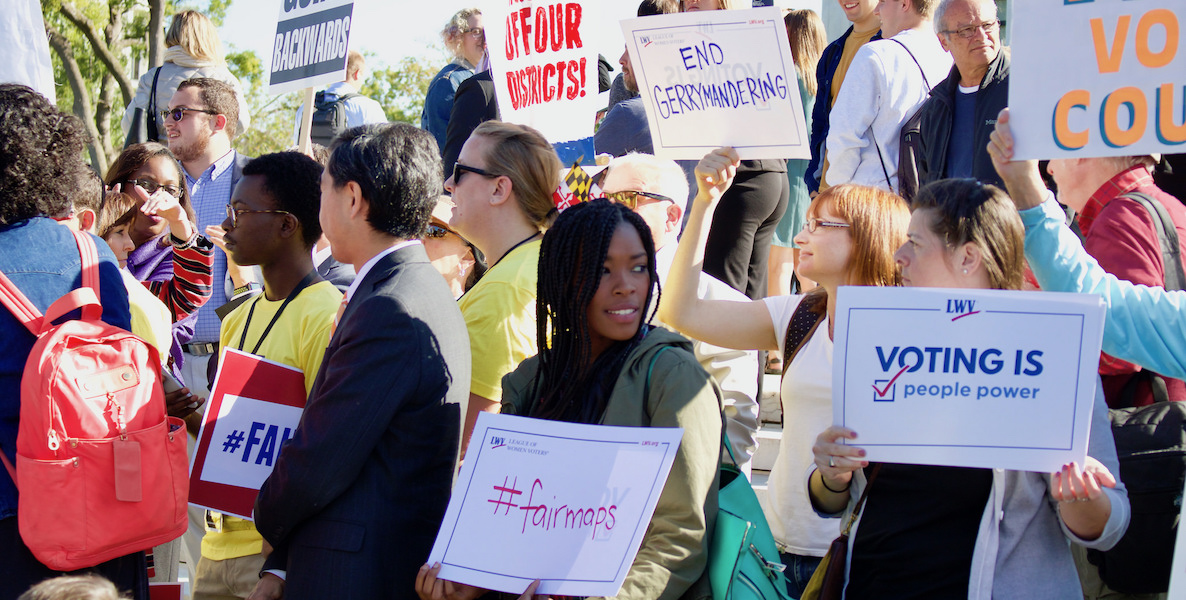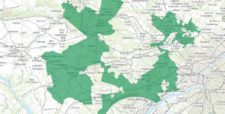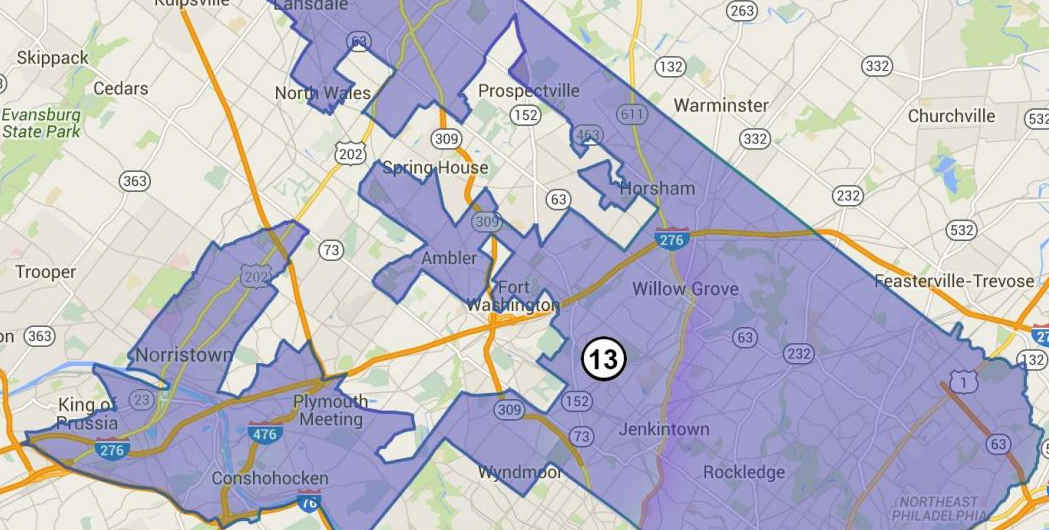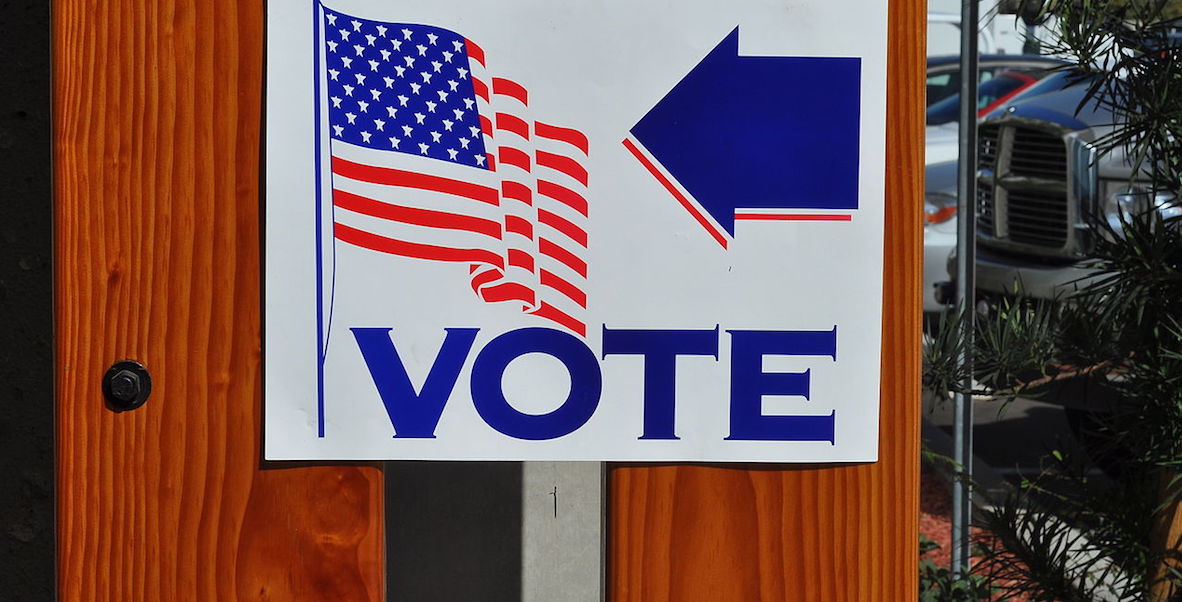A state Supreme Court trial challenging Pennsylvania’s gerrymandered Congressional district set to begin next Monday in Harrisburg is virtually certain to redesign a majority of the state’s 18 districts so significantly that it will bring a reversal of political fortunes for incumbents and would-be candidates who must start circulating nominating petitions next February 18.
The suit, filed on behalf of voters from all 18 of the state’s Congressional Districts, has been brought by the Public Interest Law Center of Philadelphia, in association with the League of Women Voters. It is crafted in such a way that it relies entirely on the authority of the state Constitution to right the wrongs of the 2011 Reapportionment, in which Republicans took advantage of their total control of state government at that time to accomplish a bare-faced gerrymander that tipped the state’s Congressional districts in their favor by 13 R. to 5 D.
The crafting of the suit to be confined to the four corners of state law is key to the petitioners strategy. Pennsylvania citizens from Philadelphia and other districts also have a parallel legal action against the gerrymander underway in Federal Court. The US Supreme Court has already heard argument on a Wisconsin gerrymander and could issue a precedent setting decision—however that decision is not expected until the spring of next year, too late to impact the 2018 elections.
The bet has been that the state suit would be acted on in time for 2018, and that it will hold up because although Congressional seats are federal it is state governments that run elections. Absent an overt gerrymandering in a state decision, it will be hard to block the drawing of new lines.
As recently as this past October it appeared this suit was about to be sidelined by the Commonwealth Court based on appeals for delay by the Republican Caucuses of the state House and Senate; but a “King’s Bench” appeal to the Supreme Court was granted in November, and the high court set up a prompt trial aimed at making a decision before the upcoming 2018 elections.
The Supreme Court’s intervention into the matter—including the ordering of an immediate fact-finding trial—has virtually cast the outcome of a dramatic redesign of the districts.
Barring an asteroid colliding with and wiping out Pennsylvania, the redrawing of Congressional Districts by order of the state Supreme Court sometime before mid-January is a virtual certainty.
The two main premises of the case are 1) a violation of the state Constitution’s exemplary provisions for “freedom of expression” (in this matter, the denial of free expression to the state’s Democrats); and 2) the Constitution’s line-drawing provisions for state Legislative seats that require that neither county nor any other local government jurisdictions, right down to the level of ward, may be divided “unless absolutely necessary.”
The pragmatic results of such discipline regarding the breaking of jurisdiction lines assures that the current map is headed for the trash heap. For example, given that the 2010 Census dictated that a Congressional seat contain 710,000 persons, Philadelphia’s population makes it eligible for two seats entirely, but not necessarily three seats shared with Montgomery and Delaware Counties, as it is now.
By the same token, Montgomery County is large enough in population to contain at least one Congressional district of 710,000 rather than being, as it is now, shared up as tapas to make a meal for five separate Congressional districts.
The suit contends that the current map of Congressional districts is the result of the distorting technique of “packing and cracking”, whereby a minority of districts, including all three based in Philadelphia, were purposefully created to contain super majorities of Democrats—near 80 percent—thus allowing the rest of the region to be creatively carved up to dilute the impact of Democrats.

Among such “cracked” districts is the infamously zig-zagging 7th, nicknamed “Goofy Kicking Donald,” which used computer demographics to pluck voters from five counties, including Delaware, Montgomery and Chester; which almost reaches as far as Reading and Lancaster; and which passes through King of Prussia in a section so narrow it is only big enough to contain a single restaurant.
Barring an asteroid colliding with and wiping out Pennsylvania, the redrawing of Congressional Districts by order of the state Supreme Court sometime before mid-January is a virtual certainty. With that act, the Court will have completed a hat-trick of historic decisions that taken together are in themselves the jurisprudential equal of an asteroid collision.
In June of this year the Court issued a decision rebirthing the powers of the Environmental Rights provision of the state Constitution, a decision which will echo down through the decades and touch every level of state government. And in September, the Court broke through a self-imposed barrier to not deal with school funding issues and set up a trial that likely will reinterpret that state’s responsibilities with regard to the funding of schools.
The off-year election of 2015 that flipped the state Supreme Court to majority Democrat is, at least within the borders of this state, looking to be as consequential as any election in recent years.
Charlie Bacas, who retired in 2009 upon the sale of a software tool company he co-founded, spent 20 years in the state government, including the Governor’s office of Bob Casey and Chief of Staff to House Majority Leader, Jim Manderino. He lives in York, PA, where among civic positions he’s served as Redevelopment Authority chairman.
Header photo: Wikimedia






